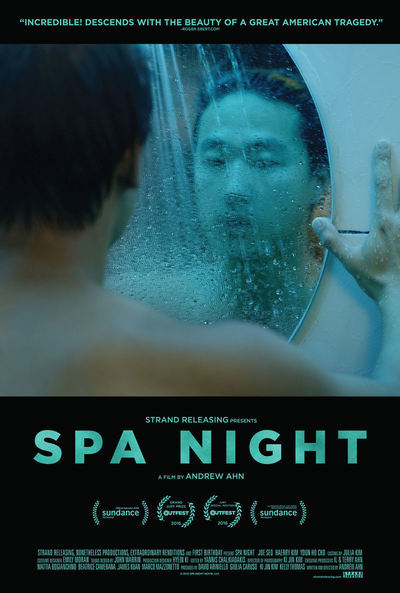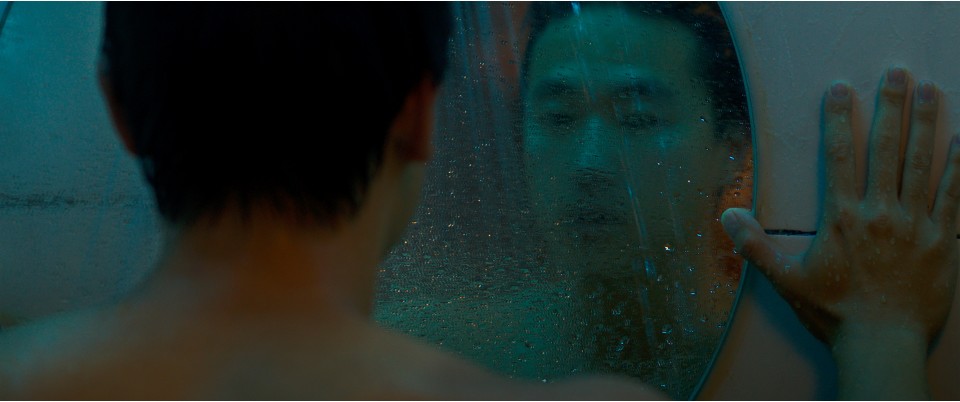
Director: Andrew Ahn
Genre: Drama
Year: 2016
Oh, the loneliness of a frame. While the cinematic form has the ability to open expansive worlds and explore vast landscapes, it can also confine its subjects to a rectangular 16×9 prison cell that they’re hopeless to escape. This couldn’t be more true than in the case of David, the protagonist of the 2016 Sundance hit, SPA NIGHT. David is a captive of his cultural identity as a first born Korean American; director Andrew Ahn’s unwillingness to capture David in anything other than an uncomfortably intimate close up never lets this captivity be forgotten.
Joe Seo won Sundance’s Jury Award for Breakthrough Performance with his portrayal of David, who is featured in every scene of this movie but only speaks in about half of them. Ahn’s long lenses follow David’s shy complacency when he’s at home suffering through his bickering immigrant parents, at church absorbing what’s expected of him, at his expensive SAT prep classes in which he’s flailing, and at the secret night shift he’s taken at the 24 hour Korean spa — the only place he’s able to express his repressed homosexuality.
SPA NIGHT takes time to settle in and requires active engagement from the viewer in order to be enjoyed and understood. But for those willing to look, there’s a lot to see through the steam. Although the film is very culture-specific, Ahn is able to make David sympathetic to those that didn’t grow up working in their parents’ Korean restaurant or aren’t pressured into getting into USC. The potential fallout from David’s parents knowing he’s gay is never explicitly stated but insinuated from their repeated prodding for him to find a girlfriend. Coming out is simply not a viable option for David; he wouldn’t be ready even if it were.
Like the best coming-of-age tales, this is not a story of David proving himself to others, but a journey of self-discovery. This is why Ahn opts to hang on Joe Seo’s evocative visage for such extended periods — he forces the audience to bear witness to David coming to terms with all the different facets of his own identity. Sometimes these moments are funny or enlightening, often they’re heartbreaking. The intensity of these close ups isn’t alleviated by the complete lack of music in the film (with the exception of a great scene where David’s father drunkenly howls a lullaby). Instead, the scenes are backed by meticulously designed sound. Considering the low budget and fast schedule on which SPA NIGHT was made, the repetitive clank of a fan or the echoing drip of a showerhead does more than supplement the emotional beats of a scene, extending the world of Ahn’s constricting frames.

“Who is that guy I see…”
SPA NIGHT meets the expectations of this particular brand of quiet, thoughtful independent cinema. Yes, it’s grounded in strong, understated performances and successfully utilizes unusual camera angles to mask the low budget with tonal consistency. But it also flounders at the finish line. It falls victim to the trapping of a kind of non-ending. David concludes the film in a different place than where he started, yet the change is so slight and shown in such a serpentine manner that it’s not satisfying. It doesn’t help that the slow pace of the film inevitably leaves a desire for a substantial payoff. The sluggishness can be attributed to not only the small scale of the story, but to the production. The film occasionally breaks open into varied locations, like a gorgeous Los Angeles driving range and, in the best sequence of the film, at the USC campus when David visits a childhood friend who’s studying business there. However, it’s mostly contained to the same interior spaces, and there’s only so many ways to make a dingy Korean American apartment look interesting.
SPA NIGHT is a testament that Hollywood needs to look no further than its own backyard to find fresh and engaging characters and communities. Despite the majority of dialogue being delivered in subtitled Korean, the piece is undeniably American. This cultural dichotomy is most apparent in the sparse moments when David chooses to speak to his parents in English. Whether these choices were improvised by Joe Soe when the cameras were rolling or premeditated in Ahn’s haiku-like screenplay is impossible to tell. It doesn’t matter. The externalization of David’s identity crisis, like the rest of SPA NIGHT, rings sad and true.
Verdict: Recommend
